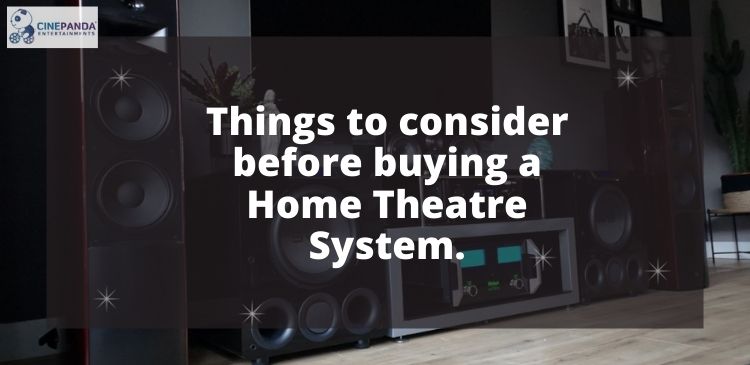A good home theatre is everyone’s choice of entertainment. When you want the best home theatre experience, then settling for a basic speaker to listen to music and watch your favorite movie is not the right choice.
Most customers prefer soundbars for their living room that is because they are more convenient and improve over built-in TV speakers. Home theatre packages include an audio amplifier- -receiver, a subwoofer, and satellite speakers. Different types of brands offer home theatres at different costs just as their features differ according to the cost.
If you are planning to buy a home theatre, you need to consider some of the following:
-
Budget and space:
At first, you need to narrow down some of your choices according to the budget you are looking for. Some of the mistakes seen mostly are that customers spend a lot of money in setting up of their room, interiors, and on the TV set, and speakers and amplifiers are often neglected by people. You have to consider the size of the room, and where to keep the speaker are to be considered. If you have a spacious room, you can consider a bigger TV set and floor-standing speakers.
-
Speakers:
A good speaker is a very important aspect of a home theatre, delivering good audio is one of the aspects everyone looks for. Some of them can be bookshelf speakers, and some of them can be bundled with floor-standing speakers. Subwoofers produce low frequencies and all other speakers are satellite speakers for the front, center, and rear channel speakers. Speakers can be set up in all the corners of your room or they can be placed on the floor.
-
A/V Receivers:
It is the heart of the home theatres; thus you need to make sure that the package you choose has a good quality A/V receiver. The technologies have advanced and they are more convenient to use. Here are some aspects to look for to zero down on a home theatre package.
-
Power:
Power output is usually denoted in watts. You should be able to offer enough power to connect all the speakers and make sure that the receiver is powerful enough. If you are looking for optimum performance, consider A/V receivers that produce at least 100 watts of power to each and every channel. Most speakers are rated from 6 to 8 ohms
Connectivity options to look for?
-
HDMI:
The number of options and connectivity ports available on the A/V receivers is important. HDMI ARC not only eliminates the need of having separate audio connections but also offers flexibility to upstream audio data. In HDMI you can connect multiple devices like gaming consoles, Blu-ray, or DVD players.
-
Video conversion and 4K upscaling:
A video conversion feature allows for the connection of different component and composite video signals which finally gets converted into digital signals.
-
Surround sound processing:
Dolby True HD is supported by the latest home theatre receivers; thus this allows you to enjoy an immersive surround sound experience right at home.
Other features available
-
Radio tuners:
You can listen to almost all the genres of music, it is better to have AM tuner in the A/V receivers.
-
Remote control:
The remote control is available in almost all home theatre packages. It has all the buttons to control the features available in A/V receivers.

